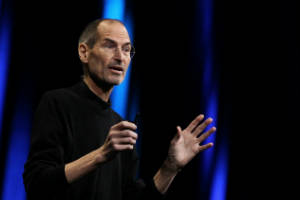
Steve Jobs, the visionary in the black turtleneck who co-founded Apple in a Silicon Valley garage, built it into the world's leading tech company and led a mobile-computing revolution with wildly popular devices such as the iPhone, died Wednesday. He was 56.
The hard-driving executive pioneered the concept of the personal computer and of navigating them by clicking onscreen images with a mouse. In more recent years, he introduced the iPod portable music player, the iPhone and the iPad tablet -- all of which changed how we consume content in the digital age.
Fortune: Ten ways Steve Jobs changed the world
His friends and Apple fans on Wednesday night mourned the passing of a tech titan.
"Steve's brilliance, passion and energy were the source of countless innovations that enrich and improve all of our lives," Apple said in a statement. "The world is immeasurably better because of Steve."
See reactions from Bill Gates, Mark Zuckerberg and many others
More than one pundit, praising Jobs' ability to transform entire industries with his inventions, called him a modern-day Leonardo Da Vinci.
"Steve Jobs is one of the great innovators in the history of modern capitalism," New York Times columnist Joe Nocera said in August. "His intuition has been phenomenal over the years."
Jobs' death, while dreaded by Apple's legions of fans, was not unexpected. He had battled cancer for years, took a medical leave from Apple in January and stepped down as chief executive in August because he could "no longer meet (his) duties and expectations."
Born February 24, 1955, and then adopted, Jobs grew up in Cupertino, California -- which would become home to Apple's headquarters -- and showed an early interest in electronics. As a teenager, he phoned William Hewlett, president of Hewlett-Packard, to request parts for a school project. He got them, along with an offer of a summer job at HP.
Jobs dropped out of Oregon's Reed College after one semester, although he returned to audit a class in calligraphy, which he says influenced Apple's graceful, minimalist aesthetic. He quit one of his first jobs, designing video games for Atari, to backpack across India and take psychedelic drugs. Those experiences, Jobs said later, shaped his creative vision.
